七年级英语下册 Unit 10 Where did you go on vacation课件 人教新目标版
人教版七年级英语下Unit10Wheredidyougoonvacation

人教版七年级英语下Unit10Wheredidyougoonvacation第一篇:人教版七年级英语下Unit 10 Where did you go on vacationUnit 10 Where did you go on vacation?1课时 Section A 1a-1c第【学习目标】1.学习谈论过去发生的事件2.学会谈论节假日的活动3.学习本课的知识点。
词汇:New York City,summer camp, museum ,guide,central,exam,really句型:—Where did you go on vacation? —I went to New York City.—Did you go to Central Park? —Yes, I did.【课前预习】预习教材P59-60,完成下列内容。
I.翻译下列短语1.呆在家里____________________2.去海滩__________________3.参观博物馆__________________4.去山区_________________5.去夏令营________________6.拜访我的叔叔_________________7.去渡假__________________II.把下列句子改为否定句和一般疑问句并回答1.She played tennis last Sunday afternoon.2.He was at home.【合作探究】1.核对课前预习的答案。
2.完成 1a,将图与左边的短语匹配。
3.听1b的录音,写出下列人物假期所去的地方。
Tina:______________________Brad:_____________________Sally:_____________________Xiang Hua:_________________Tom:_______________________4.仿照例子,用1b中的人物做对话。
湖北省武汉市为明实验学校七年级英语下册《Unit 10 Where did you go on va

一、单词基础测试Unit 10n. 野营;营地n. 博物馆纽约市夏令营adj. 中心的;位于中心的v. do的过去式(=did not)n. 考试;检查n. 向导adv. (表示疑问、惊讶、恼怒等)真的;是吗;真是的adj. 极坏的;极讨厌的adj. 极好的adj. 下雨的;多雨的adj. 不友善的;不友好的v. are的过去式adj. 廉价的;便宜的adj. 拥挤的adj. 美味的adj. 昂贵的;价高的思考;考虑;对……有特定的想法adv. 回原处;往回去n. 角落;街角;墙角v. 流泪;哭泣v. 决定;下决心v. 感觉;觉得n. (汉)胡同v. make的过去式v. 使;促使;迫使n. 宫殿n. 广场少年宫万里长城故宫天安门广场v. 走;步行;散步n. 墙壁;围墙;城墙n.水n. 同班同学v. 讨论;议论v. 做;制作n. 报告;汇报n. 性别二、短语句型Ⅰ、Useful expressions:1.去纽约市2.夏令营3.去参加夏令营4.参观博物馆5.参观(走访)某地6.进行某人的假期7.去中心公园8. 为考试学习(复习)9.思考;考虑10. 一次(长途)汽车旅行11. 很讨厌的;糟糕的12. 整天13.去漂亮的海滩(玩)14. 做某事很开心15. 在水里玩16.去博物馆17. 发现某人正在做某事18.在角落里19. 帮助某人做某事20.使某人觉得……21. 促使某人做某事22. 走回某地23. 决定做某事24.整个上午25.晚餐吃川菜26. 万里长城27. 故宫博物馆28. 天安门广场29. 对某方面提问;提关于某方面的问题30.问某人某事31.和某人讨论(某事)32.去度假的最好地方33.写一篇关于某方面的报道34.留在这儿35.出去Ⅱ、Sentences:1.你去哪儿度假了?我去爬山了。
你/他/她/他们去中心公园了吗?是的,我/他/她/他们去了。
不,我/他/她/他们没去。
2.你的假期怎么样?相当好。
人教版英语七年级下册Unit10_Where_did_you_go_on_vacation_教案
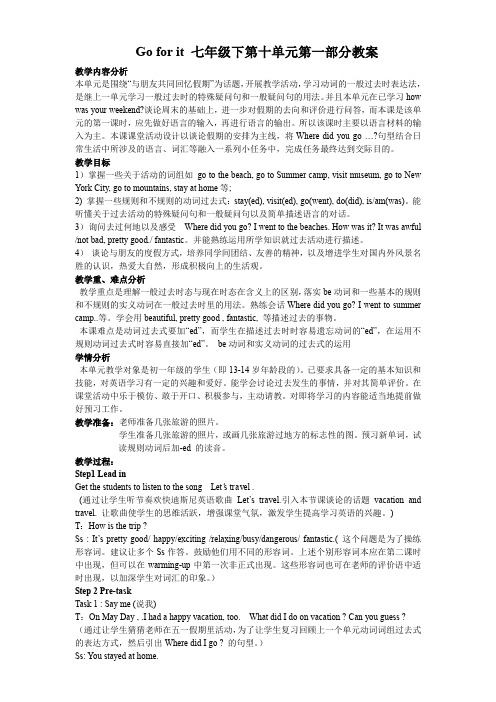
Go for it 七年级下第十单元第一部分教案教学内容分析本单元是围绕“与朋友共同回忆假期”为话题,开展教学活动,学习动词的一般过去时表达法,是继上一单元学习一般过去时的特殊疑问句和一般疑问句的用法。
并且本单元在已学习how was your weekend?谈论周末的基础上,进一步对假期的去向和评价进行问答,而本课是该单元的第一课时,应先做好语言的输入,再进行语言的输出。
所以该课时主要以语言材料的输入为主。
本课课堂活动设计以谈论假期的安排为主线,将Where did you go …?句型结合日常生活中所涉及的语言、词汇等融入一系列小任务中,完成任务最终达到交际目的。
教学目标1)掌握一些关于活动的词组如go to the beach, go to Summer camp, visit museum, go to New York City, go to mountains, stay at home等;2) 掌握一些规则和不规则的动词过去式:stay(ed), visit(ed), go(went), do(did), is/am(was)。
能听懂关于过去活动的特殊疑问句和一般疑问句以及简单描述语言的对话。
3)询问去过何地以及感受Where did you go? I went to the beaches. How was it? It was awful /not bad, pretty good./ fantastic。
并能熟练运用所学知识就过去活动进行描述。
4)谈论与朋友的度假方式,培养同学间团结、友善的精神,以及增进学生对国内外风景名胜的认识,热爱大自然,形成积极向上的生活观。
教学重、难点分析教学重点是理解一般过去时态与现在时态在含义上的区别,落实be动词和一些基本的规则和不规则的实义动词在一般过去时里的用法。
熟练会话Where did you go? I went to summer camp..等。
七年级英语下册:Unit 10 Where did you go on vacation重难点解析(
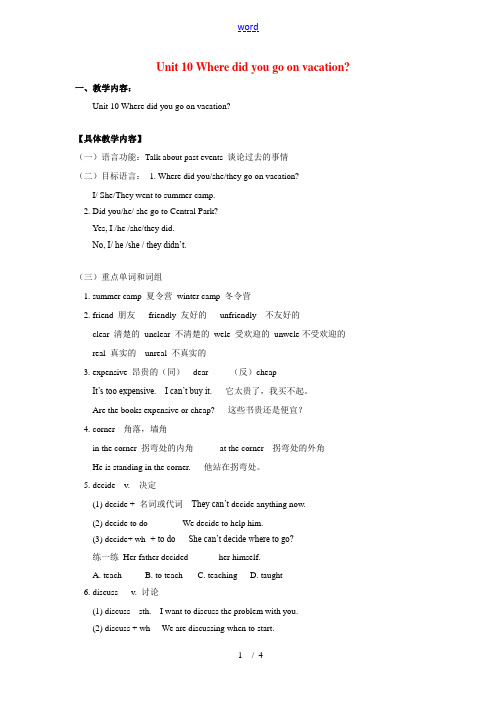
Unit 10 Where did you go on vacation?一、教学内容:Unit 10 Where did you go on vacation?【具体教学内容】(一)语言功能:Talk about past events 谈论过去的事情(二)目标语言:1. Where did you/she/they go on vacation?I/ She/They went to summer camp.2. Did you/he/ she go to Central Park?Yes, I /he /she/they did.No, I/ he /she / they didn’t.(三)重点单词和词组1. summer camp 夏令营winter camp 冬令营2. friend 朋友friendly 友好的unfriendly 不友好的clear 清楚的unclear 不清楚的wele 受欢迎的unwele不受欢迎的real 真实的unreal 不真实的3. expensive 昂贵的(同)dear (反)cheapIt’s too expensive. I can’t buy it. 它太贵了,我买不起。
Are the books expensive or cheap? 这些书贵还是便宜?4. corner 角落,墙角in the corner 拐弯处的内角at the corner 拐弯处的外角He is standing in the corner. 他站在拐弯处。
5. decide v. 决定(1) decide + 名词或代词They can’t decide anything now.(2) decide to do We decide to help him.(3) decide+ wh- + to do She can’t decide where to go?练一练Her father decided ______ her himself.A. teachB. to teachC. teachingD. taught6. discuss v. 讨论(1) discuss sth. I want to discuss the problem with you.(2) discuss + wh- We are discussing when to start.7. back adv. 回原处,往回去go back 回去 e back 回来n. 背部,后面,后部in/ at the back of…在……后面at the back of the house(反) in front of / in the front of8. the Great Wall 长城He who does not reach the Great Wall is not a true man.不到长城非好汉。
七年级英语下册(Where did you go on vacation
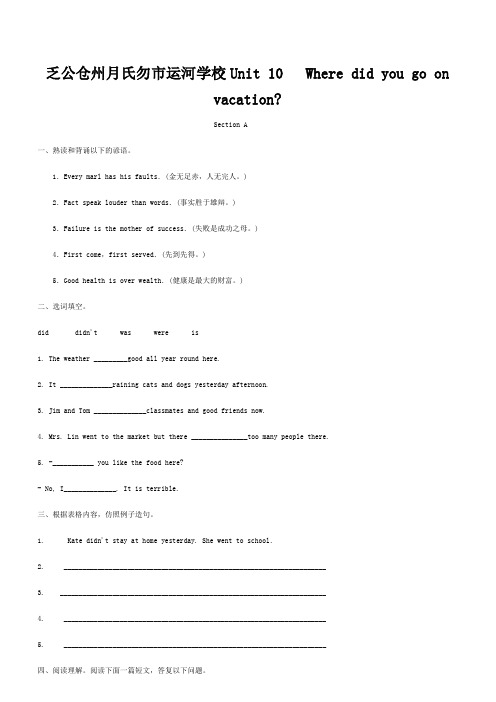
乏公仓州月氏勿市运河学校Unit 10 Where did you go onvacation?Section A一、熟读和背诵以下的谚语。
1.Every marl has his faults.(金无足赤,人无完人。
)2.Fact speak louder than words.(事实胜于雄辩。
)3.Failure is the mother of success.(失败是成功之母。
)4.First come,first served.(先到先得。
)5.Good health is over wealth.(健康是最大的财富。
)二、选词填空。
did didn't was were is1. The weather _________good all year round here.2. It ______________raining cats and dogs yesterday afternoon.3. Jim and Tom ______________classmates and good friends now.4. Mrs. Lin went to the market but there _______________too many people there.5. -___________ you like the food here?- No, I______________. It is terrible.三、根据表格内容,仿照例子造句。
1. Kate didn't stay at home yesterday. She went to school.2. ______________________________________________________________________3. _______________________________________________________________________4. ______________________________________________________________________5. ______________________________________________________________________四、阅读理解。
新目标七年级英语下册全册Unit 10- Where did you go on vacation-英文教案

新目标七年级英语下册全册Unit 10: Where did you go on vacation?英文教案Unit10:wheredidyougoonvacation?LanguagegoalInthisunitstudentslearntotalkaboutpastevents.Newlanguagewheredidyougoonvacation?Iwenttothemountains.wheredidtheygoonvacation?TheywenttoNewyork.wheredidhegoonvacation?Hestayedathome.wheredidshegoonvacation?Shevisitedheruncle.Didyougotothebeach?yes,Idid./No,Ididn't.SectionAAskquestionsaboutwhatstudentsdidlastSaturday.writes omepasttensestatementsontheboard.Ask,whowenttothemo vieslastSaturday?Pointtoastudentwhoraiseshisorherha nd.SarawenttothemovieslastSaturday.Repeat.writethis sentenceontheboard.Underlinethewordwent.Ask,whovisi tedafriendlastSaturday?Pointtoastudentwhoraiseshisorherhand.carlosvisitedafriendlastSaturday.Repeat.writethis"senten ceontheboard.Underlinethewordvisited.Pointtothewordswentandvisitedinthesentencesontheboa rd.Say,weusethesewordstotalkaboutthingsthathappened inthepast.Thenwritethesepairsofwordsontheboard:go-went,visit-visited.Askastudenttopointoutthewordsthattalkaboutt hepast.aThisactivityintroducesthekeyvocabulary.Focusattentiononthepicture.Askstudentstotellwhatthe ysee.Say,Eachpictureshowssomethingapersondidinthepa eachactivityandaskstudentstorepeat:wenttothe mountains,wenttoNewyorkcity,wenttosummercamp,visite dmyuncle,stayedathome,wenttothebeach,andvisitedmuse ums.Pointoutthenumberedlistofactivities.Sayeachoneagain andaskstudentstorepeat.Thenaskstudentstomatcheachphrasewithoneofthepicture s.Say,writetheletterofeachpicturenexttothenameofthe activity.Pointoutthesampleanswer.checktheanswers.bThisactivitygivesstudentspracticeinunderstandingthe targetlanguageinspokenconversation.Pointtothepicture.Askstudentstotellwhatthepersondid ineachscene.Forexample,TinawenttothemountainsorShew enttothemountains.Playtherecordingthefirsttime.Studentsonlylisten.Playtherecordingasecondtime.Thistimesay,Therearethr eeconversations.Thepeopletalkaboutwhattheydidonvaca tion.Listentotherecordingandwritenumbersofthenamesi nthewhiteboxesinthepicture.Pleasewriteonlyfivenumbe rs.Pointoutthesampleanswernexttothepictureshowingwe nttothemountains.correcttheanswers.cThisactivityprovidesguidedoralpracticeusingthetarge tlanguage.Pointouttheexampleconversation.Asktwostudentstoread thedialoguetotheclass.Say,Nowworkwithapartner.makeyourownconversationsabo utthepictures.Saythedialogueinthepicturewithastudent.Doasecondexa mple,ifyouwish.Thenhavestudentsworkinpairs.Astheytalk,movearoundth eroommonitoringtheirwork.offerlanguageorpronunciationsupportasneeded.2aThisactivitygivesstudentspracticeinunderstandingthe keyvocabularyinspokenconversation.Pointtothethreepeople'snamesandreadthenamestothecla ss.Pointtothethreevacationactivitiesandaskastudentt oreadtheactivitiestotheclass.Say,Thisisarecordingaboutthreepeople'svacations.Ple asematchthepeoplewiththeplacestheywenttoonvacation.Playtherecordingthefirsttime.Studentsonlylisten.Playtherecordingasecondtime.Thistime,askstudentstow ritethelettersofwherepeoplewentonvacationnexttothei rnames.Pointoutthesampleanswernexttoitem1.correcttheanswers.2bThisactivityprovidesmorelisteningpracticeusingtheta rgetlanguage.callattentiontothechart.Askastudenttoreadthroughthe namesandactivitieslisted.Say,Nowlistentotherecordingagain.Thistime,pleaselis tentotheconversationsandputacheckmarkinthe"yes,Idid."or"No,Ididn't."blankaftereachactivity.|Playtherecordingthefirsttime.Studentsonlylisten.Pointoutthesampleanswerunderyes,Ididinthefirstblank afterthewords"Nancy...gotocentralPark?"Say,DidNancy gotocentralPark?yes,shedid.Playtherecordingagain.Askstudentstoputcheckmariflin thecorrectblanks.2cThisactivityprovidesguidedoralpracticeusingthetarge tlanguage.Say,Getintogroupsofthree.oneofyouwillbeNancy,onewil lbekevin,andonewillbejulie.Askeachotheraboutthevaca tions.youcantalkabouttheactivitiesfromthechartin2bo raboutanyotheractivitiesyoulike.Asstudentstalk,movearoundtheroom,monitoringtheconversationsandofferingsupportasneeded.youmaywanttohaveagroupofstudentspresenttheirconvers ationtotheclass.3aThisactivityprovidesreadingandwritingpracticeusingt hetargetlanguage.Pointoutthepicturesinthephotoalbum.Askstudentstodes cribewhattheysee.Afterthat,readthefirsttwolinesofthedialoguetothecla ss.Pointouttheanswerwasinthefirstline.Thenpointouttheblanksintherestofthelinesofthedialog ue.Readtheconversationtotheclasssayingthewordblankf oreachblankline:Howblankthebeaches?Thensay,writethewordwasorwereineachblank.Askstudent stocompletetheactivityontheirown.correcttheanswers.3bThisactivityprovidesguidedoralpracticeusingthetarge tlanguage.Pointtoeachofthepicturesandaskstudentstosaywhatthey see.Thenreadthewordsundereachpicture.Pronounceanyne wwordsandexplainwhattheymean,ifnecessary.Forexample ,Inthispictureagirlisonabus.Thegirlistakingabustrip .Ask,whatdoesrelaxingmean?Doesitmeanyouareexcitedor quiet?Howdoyoulookwhenyourelax?Ifstudentsdon'tknowt hemeaningofrelaxing,demonstratebyleaningbackinyours eatandhalf-closingyoureyes.Say,Nowworkwithapartner.makeyourownconversationsabo utthepictures.Sayadialoguewithastudent.Pointtothefoodpicture.Ask, Howwasthefood?Thestudentreplies,Itwasawful.Doasecon dexample,ifyouwish.Thenhavestudentsworkinpairs.Astheytalk,movearoundtheroommonitoringtheirwork.offerlanguageorpronunciati onsupportasneeded.4.Thisactivityprovidesspeakingpracticeusingthetarget language.Explaintothestudentsthattheyaregoingtomakeavacation photoalbumandtalkaboutitwiththeirclassmates.youmayw anttoprovidestudentswithmagazineswhichtheycancutupf ortheirphotoalbums,oraskthemtodrawthephotosorhaveth emmaketheirphotoalbumsathomeforhomework.oncestudentshavecompletedtheirphotoalbums,drawstude nts'attentiontothevacationpicturesinthestudentbook. i ngthesimplepasttense,pointtoeachpictureanddescribea fewthingsaboutyourtimeineachplace.writewh-questions ontheboard.Remindstudentsthatthephotosinthebookinac tivity4arephotosfromyourvacation.Encouragetheclasst oaskyouwh-questionsaboutyourvacation.Havestudentsinterviewtheirclassmatesabouttheirvacat ionphotoalbums.whenstudentshaveinterviewedseveralclassmates,haveth emdiscussinpairswhereinchinatheythinkwouldbethebest placeforavacation.Itcouldbesomewhereoneofthemhasbee nto,orjustsomewheretheyhaveheardofandwouldliketovis it.Haveseveralpairsexplaintheirchoicesofvacationdestin ationtotherestoftheclass.SectionBNewlanguagedelicious,awfulexpensive,inexpensivecrowded,uncrowded1aThisactivityintroducesmorekeyvocabulary.Pointoutthesixwords.Sayeachwordandaskstudentstorepe atit.callattentiontothefirstpicture.Say,Thisisaring.Thep riceisonehundredmilliondollars.It'sexpensive!Dothes amethingforallsixpictures'.Thenpointouttheblanklineinfrontofeachnumberedword.A skstudentstomatcheachwordwithapicturebywritingthele tterofeachpictureintheblankinfrontofthecorrectword.Pointoutthesampleanswer.Asstudentswork,movearoundth eroomansweringquestionsasneeded.bThisactivityprovideswritingpracticeusingthetarget language.Pointoutthesmileyfaceandthefrownyface.Say,Thesmiley faceisforgoodthings.Thefrownyfaceisforbadthings.callattentiontothesixwordsinactivityla.Say,Nowwrite eachwordunderthesmileyfaceorunderthefrownyface.Pointoutthesampleanswer.Say,Theworddeliciousisunderthesmileyfacebecausedeliciousisahappyword.Askstudentstofinishtheactivityindividually.checktheanswers.2aThisactivitygivesstudentspracticeinunderstandingthe targetlanguageinspokenconversation.Say,Nowlistentothisconversation.Veraistalkingabouth ervacation.Pointoutthetwoquestions.Say,Afteryouheartheconversa tion,pleaseanswerthesequestions.Readthequestionstot heclass.Playtherecordingthefirsttime.Studentsonlylisten.Playtherecordingasecondtime.Thistimesay,Listentothe recordingandwritetheanswertoeachquestion.correcttheanswers.2b Thisactivityprovidesfurtherlisteningpracticeusingthetargetlanguage.callattentiontothechart.Readthewordsinthecharhervac ation,themuseums,thestores,thepeople,thefoaSay,Listentotherecordingagain.Thistime,writewhatVer athinksaboutthesethingsintheblanksiithechart.Pointoutthesampleanswer.Say,whatdoesVerathilofherva cation?Itwasgreat.Playtherecording.Studentsfillinthechart.Playtherecordingasecondtime.Askstudentstofinishfill ingintheiranswersandtochecktheiranswers.correcttheanswers.2cThisactivityprovidesguidedoralpracticeusingtbtarget language.callattentiontothequestionwords.Haveastudentreadthe mtotheclass.Say,Pleaseworkwithapartner.StudentA,youareVera'sfri end.StudentB,youareVera.StudentA,usethisquestionwor dstoaskVeraquestionsabouthervacationStudentB,youcan usetheinformationinactivities2aand2btoanswer.Helpwiththefirstquestion.Pointtoactivity2a.Askwhere didyougoonvacation?Say,Pleaseworkinpairs.Asstudentstalk,movearomtheroo m,offeringpronunciationandlanguagesupportasneeded.3aThisactivityprovidesreadingpracticeusingthetargetla nguage.callattentiontokirn'sdiary.Askadifferentstudenttore adeachentryinthediary.Answeranyquestionsstudentshav eaboutthenewwords.Explaintheinstructionstotheactivity.Pointoutthesamp leanswer"weather".Say,Theweatherwasagoodthing.Itwas"great".Say,Nowreadthediaryandcircleallthegoodthingsaboutki rn'sholiday.Underlineallthebadthings.Askthemtonotic ethedescriptionwordsthattellthemwhethersomethingis" good"or"bad".youmaywanttoaskastudenttotell youwhatthefirst"badthing"was.Askstudentstofinishtheactivityindividually.checktheanswers.3bThisactivityprovidesguidedwritingpracticeusingtheta rgetlanguage.Say,Nowwriteatraveldiaryliketheonein3a.Imagineyouar eanAmericanstudentonvacationinBeijing.Havestudentsdotheactivityindividually.youmaywanttoh avethemwriteonpiecesofpaper,sincespaceinthetextbook islimited.Astheywork,movearoundtheclassroomoffering assistanceasnecessary.Haveseveralstudentsreadouttheirdiariestotheclass.4.Thisactivitygivesstudentslisteningandspeakingpracti ceusingthetargetlanguage.Say,Nowyoucantalkaboutanimaginaryvacation.Pretendyo uareaforeignerwhocametochinaonvacation.Thinkaboutwh atnationalityyouareandtheplacesinchinayouvisited.Askstudentstogetintogroupsoffour.Tellthemtopretendt hattheyareforeignerswhomeetattheairportaftertheirva cationinchina.onestudentineachgroupbeginsbytellingw hereheorshewent.Theotherstudentsaskquestions.Thenth eyswitchroles,soeachstudenthasachancetotelltheother sabouthisorhervacation.Asstudentstalk,movearoundtheroom,offeringvocabulary andpronunciationsupportasneeded.。
七年级 下册英语第十单元《Where did you go on vacation》知识点整理
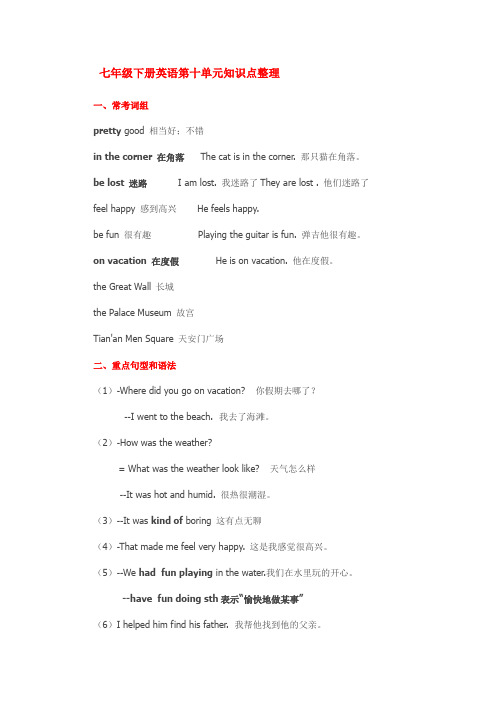
七年级下册英语第十单元知识点整理一、常考词组pretty good 相当好;不错in the corner 在角落 The cat is in the corner. 那只猫在角落。
be lost 迷路 I am lost. 我迷路了They are lost . 他们迷路了feel happy 感到高兴 He feels happy.be fun 很有趣 Playing the guitar is fun. 弹吉他很有趣。
on vacation 在度假 He is on vacation. 他在度假。
the Great Wall 长城the Palace Museum 故宫Tian'an Men Square 天安门广场二、重点句型和语法(1)-Where did you go on vacation? 你假期去哪了?--I went to the beach. 我去了海滩。
(2)-How was the weather?= What was the weather look like? 天气怎么样--It was hot and humid. 很热很潮湿。
(3)--It was kind of boring 这有点无聊(4)-That made me feel very happy. 这是我感觉很高兴。
(5)--We had fun playing in the water.我们在水里玩的开心。
--have fun doing sth表示“愉快地做某事”(6)I helped him find his father. 我帮他找到他的父亲。
help sb do sth 帮助某人做某事(7)make sb.do.sth. 使某人做某事He makes me laugh. 他让我笑。
(8)I found a small boy crying in the conner. 我发现一个小男孩在角落里哭泣 find sb.doing sth.发现某人正在做某事。
七年级英语下册-Unit-10-Where-did-you-go-on-vacation---一课件
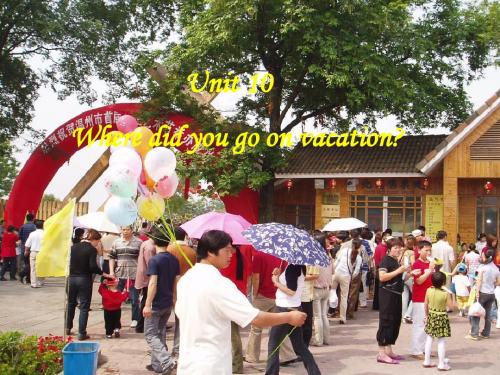
Make some conversations about your vacation.
A: Did you go to …on vacation ? / where did you go on vacation ?
B: … . A: How was your vacation / the park / the
Unit 10 Where did you go on vacation?
Where did I go on vacation ? You went to Yandang Mountains.
Yandang Mountains
Where did you go on vacation ? I went to \ visited \ … .
No, she /He didn’t.
the Palace Museum (V)
Beijing Hutong (V)
the Summer Palace (X)
1a
Match the activities with the pictures[a-g]
e 1.stayed at home __
2. Went to New York
1b 1.Tina 2. Brad 3. Sally 4. Xiang Hua 5. Tom
Do a survey
Ask your classmates about their vacation.
Ask: Where did you go on vacation?
What did you do there ? How was your vacation?
人教版七年级英语《Unit.10.Where.did.you.go.on.vacation》教案

Unit 10 Where did you go onvacation?Topic: Holidays and vacationsFunctions: Talk about past eventsStructures:Past tense of regular and irregular verbswas / wereHow questionsTarget language: Where did you go on vacation?We went to New York City.Did you go to Central Park?Yes, I did.How was the weather?It was humid.Teaching StepsPeriod 1Good morning everyone! We have finished Unit 9. Today we are going to learn a new unit—Unit 10.Step 1: Lead inAsk and answera. Can you tell me what the title of Unit 10 is? Yes, it’s Where did you go on vacation? What do you think the unit is about?b. Yes. In this unit we are going to talk about past events.Step 2: Section A 1aIn Unit 9, we talked about the recent past activities and in this unit, we are going to continue talking about the past events.First, please open your books at Page 59 and look at activity 1a.1. Look and findLet’s look at activity 1a and find what the phrases mean.2. MatchYou know what the phrases mean. Please match them with the pictures.3. Check the answersHave you finished? Let’s check the answers one by one.Answers: 1. e 2. b 3. d 4. c 5. a 6. f 7. g4. Reada. Please read the phr ases after me. Stayed at home …b. Let’s read them together.c. Would you please read them one by one?Step 3: Section A 1b1. Listen and numberListen to the tape. And number the people from 1 to 5 in the picture. 2. Check the answersLet’s check the answers.Answers: 1. went to the mountains2. visited my uncle3. stayed at home4. went to New York City5. went to summer camp3. Reada. I would like you to read the conversations together.b. Would you please read them by yourselves three times?c. This time I would like you to read them twice with your partner.d. Who would like to read in class?Step 4: Section A 1cPairwork1. ReadWould you please read the conversation in 1c with your partner?2. Practicea. Would you please make conversations with your partner to talk about where the people went on vacation in activity 1a?b. Who would like to have a try in class?Step 5: Section A 2a1. ListenNow class, let’s move to activity 2a now. Please listen to the tape for the first time.2. MatchWhere did Nancy, Kevin and Julie go on vacation? Please match the person with the place when you listen to it for the second time.3. Check the answersHave you finished? Please check your answer with your partner and see whether your answers are the same. Let’s check them together.Answers: 1. c 2. a 3. bStep 6: Section A 2b1. Listen and checka. Listen to the conversation for the first time.b. Please check (√) “Yes, I did.” or “No, I didn’t.” for each question as you hear them talk.2. Check the answersHave you finished? Let’s check them.Answers: go to Central Park? Yes, I did.play volleyball? No, I didn’t.swim? Yes, I did.go to the movies? No, I didn’t.study for exams? Yes, I did.3. Reada. Let’s read the conversations together.b. I would like you to read them by yourselves.c. Who would like to have a try to read them in class?Step 7: Section A 2cGroupworka. Now class, let’s move to activity 2c.It’s a groupwork. Would you please role play conversations between Nancy, Kevin, and Julie?b. Who would like to have a try in class?c. Well done. Please pay attention to the past forms of the verbs in the phrases.Step 8: Grammar Focus1. ReadRead the sentences in the grammar box.2. Point out the notesSimple past tense Regular verbs Irregular verbsStep 9: SummarizeLet’s summarize what we learnt in this period.Step 10: Homework1. Copy the words in activity 1a and the sentences in the grammar box.2. Practice activity 2a and 2b.Period 2Step 1: Lead inWhat did we learn in Period 1? Who can tell us? Yes. We got to know how to talk about past events. Besides them, we learnt some regular verbs and some irregular verbs. Do you still remember how to say them? OK. Let’s review them first.Step 2: Revision1. Ask and answera. Would you please translate my Chinese into English? 拜访我的舅舅、参观博物馆……b. Please practice in pairs. Student A says in Chinese and student B translates it into English.2. DictationPlease take out your dictation exercise books and let’s have a dictation.Step 3: Section A 3a1. FillNow, let’s move to a new part of lessons. Would you please look at activity 3a on Page 61? Fill in the blanks with “was” or “were” in the c onversation.2. Check the answersI think all of you did well.Answer: 1. was 2. was 3. were 4. were 5. was 6. was 7. were 8. were3. Reada. Read the conversation with your partner.b. I would like you to read it together.c. Would you like to read it in class? Please have a try.4. Explainpretty good fantastic unfriendlyStep 4: Section A 3bPairworka. Just now, we learnt how to ask about the vacation. Now, I would like you to do a pairwork to ask and answer questions about the people’s vacations in 3b. Please follow the example in 3a.b. Who would like to have a try in class?Step 5: Section A 4Game—Vacation albumJust now, we talked about some people’s vacations. How about your vacations? Please make a photo album of vacations you enjoyed. Show the album to your classmates and talk about your vacations.Step 6: SummarizeLet’s summarize what we learnt in this period.Step 7: HomeworkCopy and try to recite the conversation in 3a.Period 3Step 1: Lead inGood morning, boys and girls. Shall we continue our lessons? Could you please tell me what we learnt in Section A? Yes. We learnt to talk about the weekend.Step 2: RevisionReviewa. I will show you some pictures and some information and please make conversations.b. Let’s have a dictation.Step 3: Section B 1a1. Looka. In Section A, we talked about the vacations with some description words. In Section B, we are going to learn more description words.b. Open your books at Page 62. Would you please look at activity 1a?c. Look at the words and the pictures.2. MatchPlease match the words with the pictures.3. Check the answersHave you finished, everyone? Let’s check them together.Answers: 1. f 2. a 3. d 4. e 5. b 6. cStep 4: Section B 1b1. WriteLet’s move to activity 1b. Do you think the words in 1a are happy words or unhappy words? Write happy words on the left and write unhappy words on the right.2. Check the answersCheck the answers with your friends.Answers:Happy words: delicious, cheap, not crowdedUnhappy words: awful, expensive, crowdedStep 5: Section B 2a1. Listen and answera. Let’s move to activity 2a now. It is a listening exercise. For the first time, I would like you to listen only.b. Now, for the second time, please listen to it again and answer the questions in activity 2a.2. Check the answersI think most of you have finished it. Let’s check them together.Answers: 1. She went to Tokyo.2. Yes, she did.Step 6: Section B 2b1. ListenListen to the conversation for the first time.2. Listen and filla. Listen to the conversation again and fill in the chart.b. Listen to the conversation again and check them by yourselves.3. Check the answersLet’s check the answers together.Answers: vacation: greatmuseums: interesting, crowdedstores: expensivepeople: friendlyfood: delicious4. Read the tapescripta. Let’s read the tapescript together.b. Would you please read the tapescript in pairs?c. Please translate the conversation into Chinese in pairs.d. Who would like to read in class?Step 7: Section B 2cPairworkRole play. Student A is Vera’s friend. Student B is Vera. Talk about Vera’s vacation. Use the information in the chart above. Student A begins questions with these words: Where did …? What did …? Did you …? How was …? How were …?Step 8: SummarizeLet’s summarize what we learnt in this period.Step 9: HomeworkPractice activity 2a and 2b in Section B.Period 4Step 1: Lead inWe have finished the most part of Unit 10. And in this period, we will continue to finish Section B. But before that, I would like you to review what we learnt before.Step 2: Revisions1. Make a speechCan you make a speech according to the chart to tell us your vacation?2. DictationLet’s have a dictation.Step 3: Section B 3a1. Reada. Let’s go into activity 3a on Page 63. There is a diary from Bob.b. Please read it by yourselves. If you have any questions, please ask me.c. I would like you to read it together.2. Circle and underlinePlease circle the good things about his vacation and underline the bad things.3. Check the answersI think most of you have finished. Please check your answers with your partner.Answers:Circled items: the weather (great)the beach (beautiful)playing in the water (fun)helping the little boy find his father (happy)playing tennis (really fun)eating Sichuan food (delicious)Underlined items: shops were too crowded (didn’t really enjoy them)museum (kind of boring)no money for taxi / walking back to hotel (tired)4. ExplainLet me explain some key words and phrases to you.all day have a fun doing sth. be crowded kind of find sb. doing sth. be lost help sb do sth. make sb. do sth. walk back to decide to do sth. all morning for dinnerStep 4: Section B 3b1. WriteImagine you are an American student on vacation in Beijing. Would you please write a travel diary according to the pictures given below?2. Reada. Please read your diary to your partner.b. Who would like to have a try to read it in class?Step 5: Section B 4GroupworkImagine you are all foreigners on vacation in China. You meet each other at the airport on your way home. Talk about what you did on your vacation.Step 6: SummarizeLet’s summarize what we did in this period.Step 7: HomeworkTry to recite the article in 3a.Period 5Step 1: Lead inWe have spent four periods on Unit 10. This is the last period of Unit 10. In this period, we will do some exercises and make sure you learn this unit well.Step 2: Self-check-11. Check the words and the phrases you knowOpen your books and look at Self-check-1. If you know the words and the phrases well, please check them.2. ReadI would like all of you to read the words and the phrases together.Step 3: Self-check-21. Do you have any other words you don’t know? Please write them in your exercise books.2. Please ask your friends for help.3. Looking up the dictionary is also a good way to study English. I hope you can get more from dictionaries.Step 4: Self-check-31. CompleteLet’s move to Self-check-3 now. First, I would like you to complete the form below.2. Make a surveya. Make questions about vacations. Write some questions about vacations.b. I would like you to ask your partner the questions you write and write down their answers.c. Discuss the best place for a vacation with your classmates.3. WriteWrite a report on student s’ vacations.Step 5: SummarizeLet’s summarize what we did in this period.Step 6: Homework1. Do the exercises on the Students’ Book and the textbook.2. Review Unit 10.3. Watch the pictures in Just for fun on Page 64.这份文件是人教版七年级英语《Unit 10 Where did you go on vacation?》的教案,主要涵盖了五个教学周期(Period)的内容,每个周期都详细规划了教学目标、教学活动、教学方法以及课后作业。
七年级英语下册第七单元Unit 10 Where did you go on vacation-知识点整理
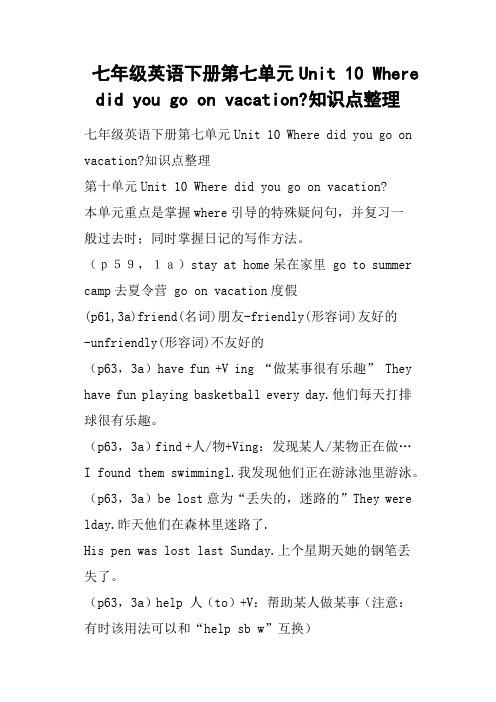
七年级英语下册第七单元Unit 10 Where did you go on vacation?知识点整理七年级英语下册第七单元Unit 10 Where did you go on vacation?知识点整理第十单元Unit 10 Where did you go on vacation?本单元重点是掌握where引导的特殊疑问句,并复习一般过去时;同时掌握日记的写作方法。
(p59,1a)stay at home呆在家里 go to summer camp去夏令营 go on vacation度假(p61,3a)friend(名词)朋友-friendly(形容词)友好的-unfriendly(形容词)不友好的(p63,3a)have fun +V ing “做某事很有乐趣” They have fun playing basketball every day.他们每天打排球很有乐趣。
(p63,3a)find +人/物+Ving:发现某人/某物正在做…I found them swimmingl.我发现他们正在游泳池里游泳。
(p63,3a)be lost意为“丢失的,迷路的”They were lday.昨天他们在森林里迷路了.His pen was lost last Sunday.上个星期天她的钢笔丢失了。
(p63,3a)help 人(to)+V:帮助某人做某事(注意:有时该用法可以和“help sb w”互换)Lillps (to) us study English. 莉莉经常帮助我们学英语。
=Lillps us with English.(p63,3a)make sb do sth 让/使某人做某事 Ouakes us go to bed(按时).我们的妈妈经常让我们按时睡觉。
(p63,3a)decide to do sth 决定做某事 They decide to go to summer camp.他们决定去夏令营。
初中七年级下册unit 10Where did you go on vacation 人教版

Unit 10 Where did you go on vacation?重点句子1.询问别人怎么度过假期Where did go on vacation? How was your vacation?What do you think of your vacation? Did you go to ~?2.告诉别人怎样度过假期I went to the mountain. We had great fun playing in the water.3.询问天气情况及答语—How was the weather? —It was humid.重点短语Go on vacation 去度假summer vacation 暑假stay at home 待在家visit sb 拜访/看望某人visit sp 参观某地summer/winter camp 夏/冬令营think of 思考,考虑have fun playing in the water 在水中玩得很高兴the Great Wall 长城the Palace Museum 故宫go to the mountains 去山区Go to the beach 去沙滩find sb doing sth 发现某人正在做某事decide to do sth 决定做某事重点难点1.It was sunny and hot all day. It 指代天气all “全,整个”。
All night 整夜,all summer 整个夏天all year 整年all week 整周2.The shops were too crowded, so I didn’t really enjoy it. crowded “拥挤的,挤满人群的”The street is crowded with people. 街上挤满了人。
注意表示交通拥挤要用heavy/busy traffic 或者说rush hourEnjoy 用法○1欣赏;享受;喜爱[+v-ing] I enjoy songs such as this one. 我欣赏像这首一样的歌。
2019-2020年初一英语下册Unit10 Where did you go on vacatio

Unit10 Where did you go on vacation?一、单项选择()1.The boys are having great fun ______ in the waves.A.play B.to play C.played D.playing()2、Thank you very much for _________us so well.A .teach B. teaching C. teaches D. taught()3. How’s the weather in Shanghai ? _________.A. It raining.B. It is rain C .It is rainy. D. It rai ny.()4、It has five _______ years of history.A. thousand B.thousands C.thousand of D.thousands of ()5.—When _______ a sports meeting? ---Last Monday.A. had you B.do you have C.did you have D.will you have ()6、How is it going? ______.A. It's sunny. B.It's hot. C.It's right. D.It's pretty good()7.Listen! Who ________?A. sings so well.B. is sing so wellC. is singing so wellD. singing so well( ) 8. “You are a very beautiful girl.” “________”A. No, I’m not.B. Sorry, I don’t.C. Thank you.D. Yes, I d o.( )9 He didn’t have_____ money for a taxi, ______ he walked back to th e hotel.A. any, andB. much, becauseC. any, soD. some, so( ) 10. On Sunday morning I helped my mother ____ the cooking.A. doB. to doingC. doesD. doing( ) 11.---__________ ?---He did some reading at home.A. What does your father do yesterday eveningB .What does your brother do in the schoolC. What did your brother do over the weekendD. Where did your brother go last Sunday( ) 12. I cleaned my classroom ____________.A. with three hoursB. three hours agoC. in three hours D .three hours before( ) 13. Did you go shopping yesterday? _________.A Yes, I doB Yes, I didC Yes, I amD No, I couldn’t( )14._______ you ________ soccer over the weekend?A. Did, playedB. Do, playedC. Did, playD. Did, plaied ( )15.. ---What ______ they doing? ---They _____studying.A. are, areB. is, isC. was, areD. are, do二.词汇填空根据所给句意及首字母提示完成下列单词拼写使句意通顺完整。
七年级英语下册复习笔记《Unit10 Where did you go on vacation》
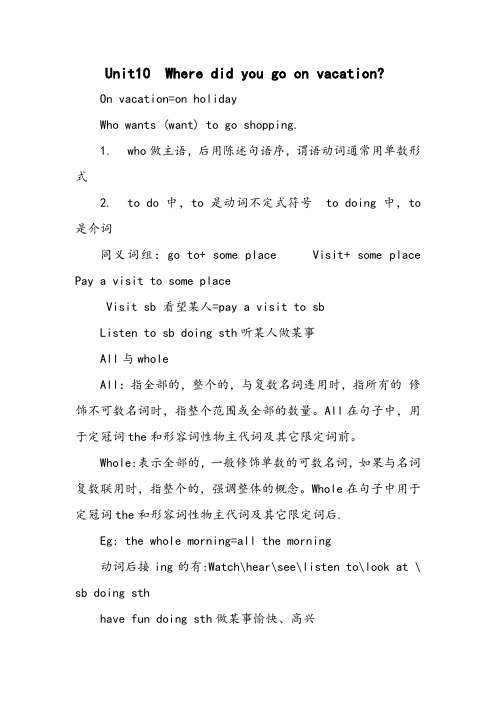
Unit10 Where did you go on vacation?On vacation=on holidayWho wants (want) to go shopping.1. who做主语,后用陈述句语序,谓语动词通常用单数形式2. to do 中,to是动词不定式符号 to doing 中,to是介词同义词组:go to+ some place Visit+ some place Pay a visit to some placeVisit sb 看望某人=pay a visit to sbListen to sb doing sth听某人做某事All与wholeAll:指全部的,整个的,与复数名词连用时,指所有的修饰不可数名词时,指整个范围或全部的数量。
All在句子中,用于定冠词the和形容词性物主代词及其它限定词前。
Whole:表示全部的,一般修饰单数的可数名词,如果与名词复数联用时,指整个的,强调整体的概念。
Whole在句子中用于定冠词the和形容词性物主代词及其它限定词后.Eg: the whole morning=all the morning动词后接ing的有:Watch\hear\see\listen to\look at \sb doing sthhave fun doing sth做某事愉快、高兴enjoy、practice、discuss、mind加doing sthfind sb doing sth发现某人正在干某事(doing现在分词做宾语补足语)find 、look for、find out 的区别find:表示寻找的结果look for:表示寻找的过程 find out:发现、找到……的答案In the corner、屋子里的一个角落on the corner 、at the corner大街的某一个拐角Come back 回来 go back回去Get back 取回 give back归还Discuss sth讨论某事 Discuss sb with sth和某人讨论某事 Discuss doing sth。
【知识学习】新目标七年级英语下册Unit 10 Where did you go on vacati

新目标七年级英语下册Unit 10 Where did you go on vacation?教案教案正文随堂记录Unit10wheredidyougoonvacation?单元教材分析本单元是九年制义务课程标准实验教科书《新目标英语》七年级下册第10单元本单元的核心话题是用一般过去时谈论度假等发生在过去的事情。
因此“wheredidyougoonvacation?""Didyougotothebeach?yes,Idid.No,Ididn’t.”等是教学的重点。
通过对本单元的学习,学生能掌握本单元出现的地点名词,用于询问和回答过去发生的事情的短语和句型。
单元知识结构 1.词汇:Newyorkcity;centralPark,exam,were,rainy,delicious,expensive,inexpensive.crowded.flew,kite,later,felt,little,corner,discuss,etc2.句型:wheredidyougoonvacation?Iwenttosummercamp.Didsh egotocentralPark?yes,shedid.No,shedidn’t3.语法:一般过去时特殊疑问句、一般疑问句及肯、否定回答。
单元总体目标.masterthevocabulary2.masteranduse:wheredidyougoonvacation?Iwenttosummercamp·Didshego tocentralPark?yes,shedid.No,shedidn’t单元教学重难点一览重点难点1.VocabularyandExpressions2.GrammarFocus:wheredidyougoonvacation?Iwenttosummercamp.DidshegooncentralPark?yes,shedid.No,shedidn’tUsethepasttensetotalkaboutactivitiesthathappenedin thepastinEnglishwiththefollowingsentences:wheredidyougoonvacation?Didyougoto…?yes.…/No,…单元学情分析学生在第五单元已接触过一般过去时,具有了学习本单元知识的认知前提,能自然地与本单元话题进行衔接。
七年级英语新目标下册unit10 Where did you go on vacation

nfriendly 8.The dog didn’t let me in. It was u________to me. oney 9.I didn’t have any m_______ for a taxi, so I walked back to the hotel. playing 10.We had great fun __________(play) football. to go 11.Jim decided ____________(go) to Shanghai. 12.Mary found her brother ________(sit) in the sitting corner. (to) find 13.Let me help you ________(find) him. 14.Her story made us _________(feel) sad. feel
了
3.make sb. do sth. 让/使某人干某事 The movie makes me relaxing. 4.let / have sb. do sth. do前不带to. Let the boy do his homework alone . 5.feel+ adj. 感到... I feel hungry / tired /happy / excited 6.decide to do sth. 决定干某事 They decided to go to Hainan on vacation .
我们学英语有很多乐趣 . 2. find sb. doing sth. 发现某人在干某事 . find sb. do sth. 发现某人干过某事 I find him reading the novel (小说).我看见 小说) 小说 我看见
- 1、下载文档前请自行甄别文档内容的完整性,平台不提供额外的编辑、内容补充、找答案等附加服务。
- 2、"仅部分预览"的文档,不可在线预览部分如存在完整性等问题,可反馈申请退款(可完整预览的文档不适用该条件!)。
- 3、如文档侵犯您的权益,请联系客服反馈,我们会尽快为您处理(人工客服工作时间:9:00-18:30)。
Do a survey
Ask your classmates about their vacation.
Ask: Where did you go on vacation? What did you do there ? How was your vacation? Name Mary Place Hong Kong Activities went to the beaches Weather sunny warm feeling Interesting exciting
Homework:
Write about your vacation in your exercise book.
Where did he go on vacation ? She visited Weihai.
Where did she go on vacation ? She visited Wuxi.
Where did he go on vacation ? He visited Xiamen.
Where did he go on vacation ? He visited Shaoxin.
Task: Decide on next vacation destination. • I decided to go to Hong Kong. • Mary went there last summer vacation. The weather there was sunny, warm and humid. The food was delicious. I love it. • I think it was very great. • So I want to go there next vacation.
Unit 8 Where did you go on vacation ?
Enjoy an English song
What did you do? What did you do? Had dinner. Had dinner. I had dinner. I had dinner. What about you? What about you? Did you clean your room? Did you clean your room? Yes, I did. Yes, I did. I cleaned my room. I cleaned my room. How about you? How about you?
Where did he go on vacation ? He visited the USA. He went to New York City .
e 4 b d c a f g 2 1 5 3
两人一组,选好题号 一人面向屏幕,表演图中内容 另一人猜测: 两人一组 选好题号,一人面向屏幕 表演图中内容,另一人猜测 选好题号 一人面向屏幕 表演图中内容 另一人猜测 What did he do on vacation?
Where did he go on vacation ? He went to the mountains .
Where did he go on vacation ? She visited Taishan.
Where did she go on vacation ? She stayed at home and did homework .
He went to the mountains last weekend.
museum /mju:`zl∂m/ Where did they go on vacation ? They visited the museum .
summer camp /kæmp/
Where did they go on vacation ? They went to summer camp .
He cooked the meal.
They danced.
He studied for the English test/exam. / Ig`zæm / He cleaned his room.
She did her homework.
Look at the pictures carefully and guess what they did. (仔细看图并抢 仔细看图并抢 答)
… … …
Report like this: My friend Mary went to Hong Kong on her
vacation .She Went to the beaches. The weather there was sunny and warm.she felt very interesting and exciting.
Central park /`sentr∂l/ guide/gald /
c a b
V V V V
Make some conversations about your vacation. A: Did you go to …on vacation ? / where did you go on vacation ? B: … . A: What did you do there? B: … . A: How was your vacation / the park / the weather /…? B: … . A: How were …? B: … .
What did he do last weekend?
He stayed at home last weekend.
What did he do last weekend?
He practiced English last wee weekend?
He went swimming last weekend.
Where did he go on vacation ? He visited Shanghai.
Where did she go on vacation ? She went to the beach.
Where did they go on vacation ? They visited Qingdao.
What did he do last weekend?
He played tennis last weekend.
What did he do last weekend?
He played basketball last weekend.
What did he last weekend?
He watched TV last weekend.
What did she do last weekend?
She did some running last weekend.
What did he do last weekend?
He took a shower last weekend.
What did he do last weekend?
